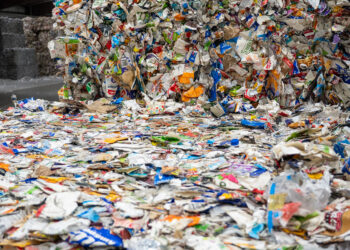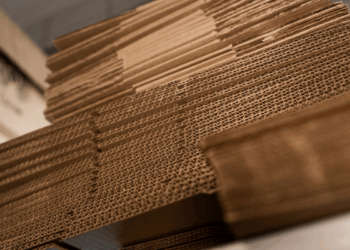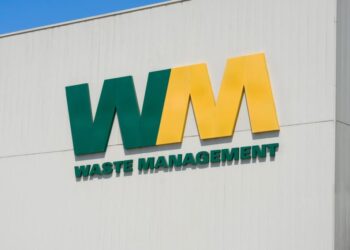Recycling facility operators across North America continue to scramble to install systems aimed at hitting the higher quality standards buyers are demanding.
In California, a regional processor recently completed major upgrades at its marquee recycling facility in San Francisco. In Arizona, the public and private sector are collaborating on a major facility overhaul. And a Canadian operator is adding new technology to two plants.
While retrofits have always been a reality in the MRF sector, the pace of action has picked up considerably in the second half of 2018 and the first part of this year.
It’s a sign of the pressures recycling programs and companies face in the wake of China’s National Sword policy action. At the same time, they are trying to keep pace with the ever-shifting material stream.
“Paper mills and manufacturers that receive bales of recycled plastics now demand that materials shipped to them contain less than 1 percent impurities,” Recology, the company that upgraded the San Francisco MRF, wrote in a press release. “Some cities say they cannot meet the new standard. San Francisco says, ‘Together we can.'”
Closed Loop Fund involvement in Phoenix
Stakeholders in one of the most populous cities in the Southwest have seen the economics of recycling shift in a disconcerting way over the last year.
The North Gateway Transfer Station in Phoenix experienced a $1.8 million drop in revenue in 2018. But changes are on the way.
The city-owned MRF is operated on a contract by ReCommunity, a company purchased by Republic Services in the fall of 2017. It sorts recyclables from the curbside recycling program in Phoenix.
Now, the facility is investing $4.5 million in upgrades that will include multiple screens, plastic sorting equipment, and a larger and improved presort line, according to the Arizona Republic newspaper. The Closed Loop Fund is kicking in $3 million, the nearby city of Peoria, Ariz. (which hauls a significant volume of material to the transfer station) is putting in $1 million, and the city of Phoenix is contributing $500,000.
According to City Council documents, the equipment upgrades will “restore the loss of yield and production speed necessary to comply with new quality standards for recycled commodities.”
The improvements, which are slated to be installed by the summer, are expected to increase MRF revenue by up to $200,000 per month, according to the newspaper.
Phoenix isn’t the only Arizona municipality to receive MRF investments. Republic Services recently invested more than $3 million in facility upgrades at its Salt River Recycling Facility, industry publication Waste Dive reported. This MRF handles recyclables from the city of Scottsdale and other communities.
Waste Dive noted that the upgrades, which include a new OCC screen deck, glass breaker, scalping screen and more, are part of a wider company strategy to retrofit MRFs in response to shifting market demands.
A $14 million project retrofit
Meanwhile, to the north, Recology has finished a significant project at its 200,000-square-foot Recycle Central plant on San Francisco’s Pier 96.
The effort was three years in the works and it completed during 2018. Although it was technically underway before China implemented import restrictions, Recology noted in a release that the $14 million facility upgrade will help the company and municipal program rise to the challenge of meeting new quality demands.
The facility “is now home to seven optical sorters, including new state-of-the-art sorting machines from France that allow us to sort more and smaller materials,” the company stated.
In addition to the recycling facility upgrade, Recology added a $19 million organics wing to its San Francisco transfer station, increased outreach efforts, distributed larger recycling carts and smaller garbage containers, and sought out new buyers for recycled materials.
‘Increasingly rigorous quality standards’
The push to enhance MRF lines has not been limited to the U.S. Canadian operator Canada Fibers is upgrading an existing facility while also launching a new site.
The company in February announced the details: a new MRF in Winnipeg, Manitoba, slated to begin operating this fall, and a retrofit of its Peel, Ontario facility that will be completed early next year.
“The catalyst for investment involved recognition that incoming materials, incoming post-consumer residential recyclable materials are really changing,” said Mark Badger, executive vice president for the company, in an interview.
At the same time, quality standards are increasing across the board. “You have to make things purer than they ever were before,” Badger said, adding that National Sword is creating repercussions far beyond China. “I joke that it’s really ‘International Sword’ because similar sorts of strict quality standards are being imposed by other nations.”
The new facility in Winnipeg will incorporate infrared-equipped optical sorters that the company expects will achieve high recovery rates and purity levels. Additional unspecified equipment will allow flexibility in sorting new types of material as the stream changes, the company stated. The building will total 80,000 square feet.
The retrofit project in Ontario, meanwhile, involves similar technology. The company noted the equipment will “enable optimal recovery, purity and flexibility to respond to changing inbound material composition and stricter end market quality requirements.”
Machinex will provide the equipment for both facilities. Although he didn’t provide specifics, Badger noted the equipment will provide “substantial automation to augment the efforts of employees.”
A key priority for the company was to spend funds where they’ll have a lasting impact. After all, Badger said, current conditions can shift rapidly.
“The new normal is probably the new abnormal,” Badger said. “You have to be investing knowing things are going to continually change. You have to be investing in a very flexible, accommodating facility.”
The company estimates both facilities will sort more than 100,000 metric tons of material per year. Badger declined to offer details on the cost of the two projects.
Canada Fibers currently operates 13 MRFs across Ontario, including the Peel site.
Over $500,000 for robotic assistance
One of the latest trends in sortation technology is the use of artificial intelligence-powered robotic systems that can identify items on the belt and be programmed to pick off different commodities.
Robots will be installed at a Clackamas, Ore. MRF, thanks to government grant funds aiming to boost local recycling infrastructure.
Pioneer Recycling Services will purchase and install two sorting robots to improve container recovery at the company’s MRF outside Portland, Ore. The company received a $284,000 grant from Metro, a regional government entity covering three counties in the Portland area, and Pioneer put up matching funds to complete the purchase.
The robots “will use artificial intelligence on the sort lines to process recyclable materials faster and more effectively, thus improving the marketability of those materials,” according to Metro.
They will be placed on the the commingled material stream and will sort faster and produce a cleaner product than is currently accomplished with manual sorters, Metro stated. The robots also position Pioneer for future stream changes, as the artificial intelligence technology allows the robots to adapt to material shifts and continue sorting with accuracy.
Overall, the equipment will allow Pioneer to process up to 3,500 additional tons per year of plastic, paper and metals.
Photo credit: Resource Recycling file photo.





























